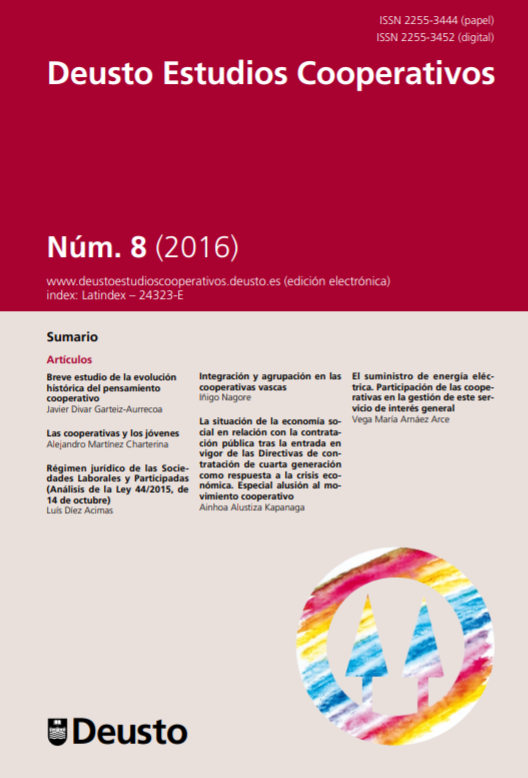La situación de la economía social en relación con la contratación pública tras la entrada en vigor de las Directivas de contratación de cuarta generación como respuesta a la crisis económica. Especial alusión al movimiento cooperativo
Abstract
The social economy, and specifically the cooperatives as an integral part of it, have a proven capacity to promote the exit of the economic crisis, and the institutions have the duty of promoting and fostering them. On the other hand, the European institutions have taken positions in relation to the crisis and have determined the need to address their politics towards sustainable criteria as the only secure way to get out of it. As a result, in 2014 were passed the «fourth generation» EC Public Procurement Directives, that reinforces the inclusion of social clauses in the public procurement processes. This article aims to analyse those two circumstances to assess the extent of the enhancement of the public procurement with different actors that are included in the social economy, and specially with the cooperatives, after the adoption of the fourth generation EC Public Procurement Directives.
Received: 21 November 2016
Accepted: 20 December 2016
Downloads
The authors, by submitting their manuscripts to the Deusto Estudios Cooperativos (DEC), accept the conditions listed below on copyright and undertake to comply with them. They do not sign any document of assignment of rights to the Publisher.
1. Authorship: The author must be the sole creator of the work or legally acting on behalf of and with the full agreement of all the authors.
2. Copyright and Code of conduct:
a) Authors warrant that their work is original; has not been previously copyrighted or published in any form; is not under consideration for publication elsewhere; its submission and publication do not violate the Ethical Guidelines of DEC and any codes (of conduct), laws or any rights of any third party; and no publication payment by the Publisher (University of Deusto) is required.
b) Authors grant to the Publisher the worldwide, sub-licensable, and royalty-free right to exploit the work in all forms and media of expression, now known or developed in the future, for educational and scholarly purposes.
c) Authors retain the right to present, display, distribute, develop, and republish their work to progress their scientific career provided the original publication source (DEC) is properly acknowledged.
d) Authors warrant that no permissions or licences of any kind have been granted or will be granted that might infringe the rights granted to the Publisher.


3.jpg)
3.jpg)







